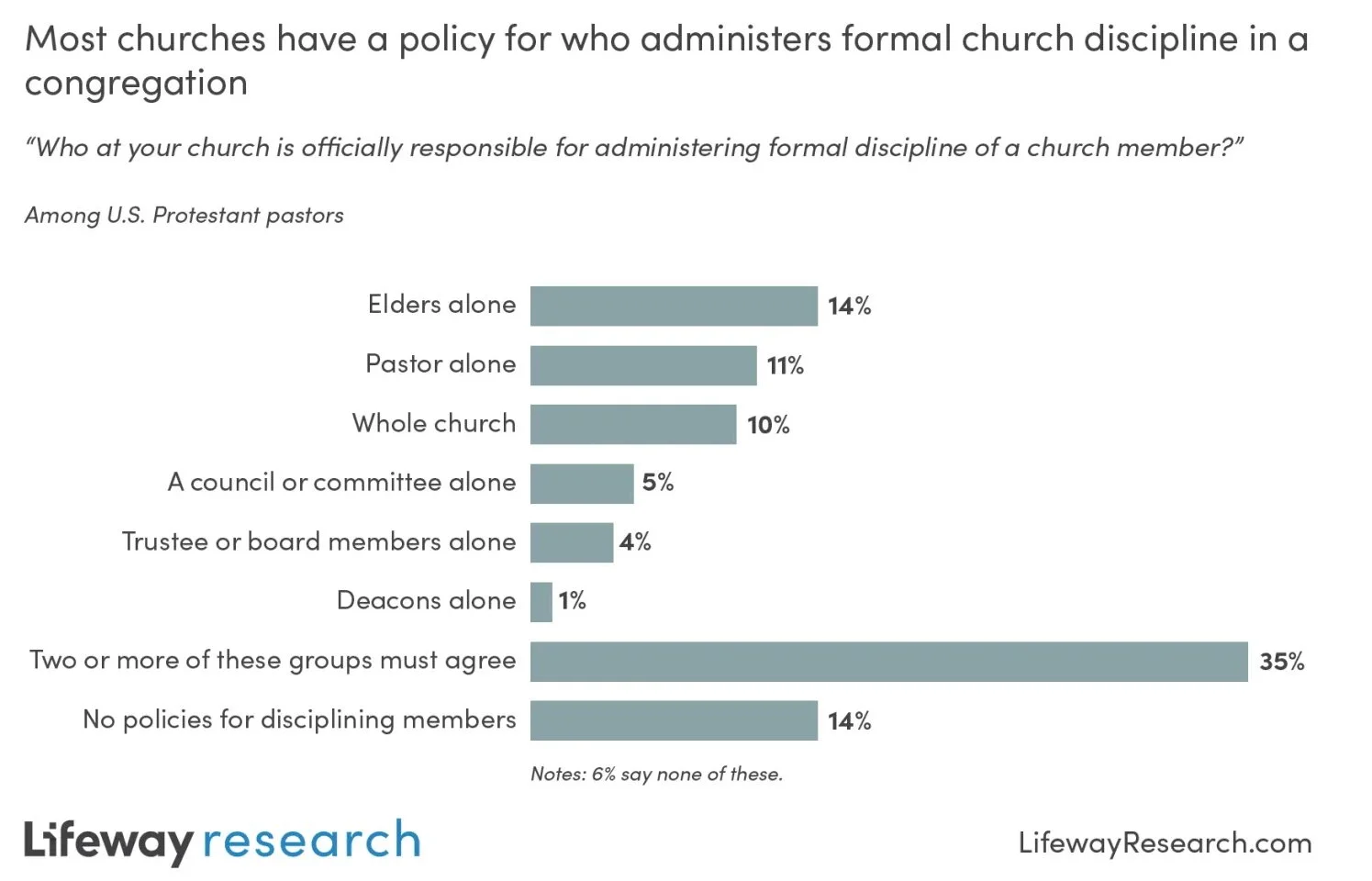Most Churches Have Discipline Policies, But Few Use Them
Most pastors say their churches have policies in place to address significant misbehavior by church members, but few have actually used those policies recently.
According to a Lifeway Research study of more than 1,000 U.S. Protestant pastors, only one in six say their church has formally disciplined anyone in the past year.
“The infrequency of church discipline is not because church members aren’t sinning,” said Scott McConnell, executive director of Lifeway Research. “Church discipline typically occurs when a member is not repentant for a sin or is no longer qualified for a role because of sin.”
Discipline practice
Pastors haven’t felt the need to practice church discipline in their congregations frequently, if at all. Most U.S. Protestant pastors (54%) say their churches haven’t formally disciplined a member since they became the pastor, nor was it done previously, as far as they know.
More than 1 in 5 (22%) say it has been three or more years, while 3% say it has been around two years. Almost 1 in 7 have disciplined someone recently, including 6% in the last year, 6% in the past six months and 3% in the last month. Those figures are statistically unchanged from a 2017 Lifeway Research study.
While church discipline is rare generally, the practice is even rarer among those affiliated with mainline denominations. Less than half (47%) of evangelical pastors say they’re not aware of anyone being disciplined at their churches, while 70% of mainline pastors claim that is the case in their congregations. Methodist pastors (82%) are the most likely to say church discipline has not happened at their churches.
Meanwhile, larger churches are among the least likely to have avoided practicing church discipline. Around a third (35%) of pastors at churches with at least 250 in worship attendance say no one has been formally disciplined, fewer than any other church size.
“The more people you have in your church, the more likely someone’s behavior warrants discipline,” said McConnell. “Teachings and traditions also play into a church’s willingness to discipline someone.”
Discipline preparation
Even if they rarely or ever use them, four in five churches have discipline policies. Only 14% of U.S. Protestant pastors say they have no official policies in place for disciplining members.
When asked who at the church is responsible for administering formal discipline of a church member, 14% say the elders alone, 11% point to pastor alone and 10% say the whole congregation. Fewer say the responsibility resides in a council or committee alone (5%), trustees or board members alone (4%) or deacons alone (1%). More than a third (35%) say the process states two or more of these groups must agree, while 6% say none of these.
“Different churches have different decision-making structures. When it comes to disciplining a member, this decision is most often implemented by more than one decision-making group within the church. This is likely driven by a desire for unity through a difficult decision,” said McConnell.
Mainline pastors are almost twice as likely as evangelical pastors to say their churches have no official discipline policies (21% vs. 12%). Methodists are the most likely to say they have no such policies in their congregations (36%).
Churches with fewer than 50 in attendance are also around twice as likely as congregations with more than 100 in attendance to report no formal church discipline policies (19% vs. 9%).
White pastors are the most likely to say church discipline is the responsibility of elders alone (16%), while African American pastors are among the most likely to say it falls to the pastor alone (21%).
Discipline purpose
The Bible addresses church discipline at least twice. The long-term goal in each passage is repentance and restoration of the offending members.
In Matthew 18, Jesus lays out a process for going to an individual directly to confront wrongdoing. If that doesn’t work, Jesus says to bring additional witnesses. If that also fails, the issue should be brought before the whole church. In 1 Corinthians 5, Paul instructs the church at Corinth to confront sinful members and remove them from the congregation.
Around 4 in 5 U.S. Protestant pastors (83%) say their churches seek to lovingly and biblically confront unconfessed sin, including 51% who strongly agree. Few (14%) disagree, and 3% aren’t sure.
Evangelical pastors are more likely than mainline pastors to say this is the case in their congregations (89% v. 74%). Denominationally, Restorationist Movement (94%) and Baptist (90%) pastors are more likely than Lutheran (82%), Presbyterian/Reformed (73%) and Methodist (69%) pastors to agree their churches aim to lovingly and biblically confront unconfessed sin.
“Confronting unconfessed sin is both for the benefit of the local church and the individual,” said McConnell. “Most churches look to follow biblical guidelines in these cases.”
For more information, view the complete report.
Aaron Earls is the senior writer at Lifeway Research.


